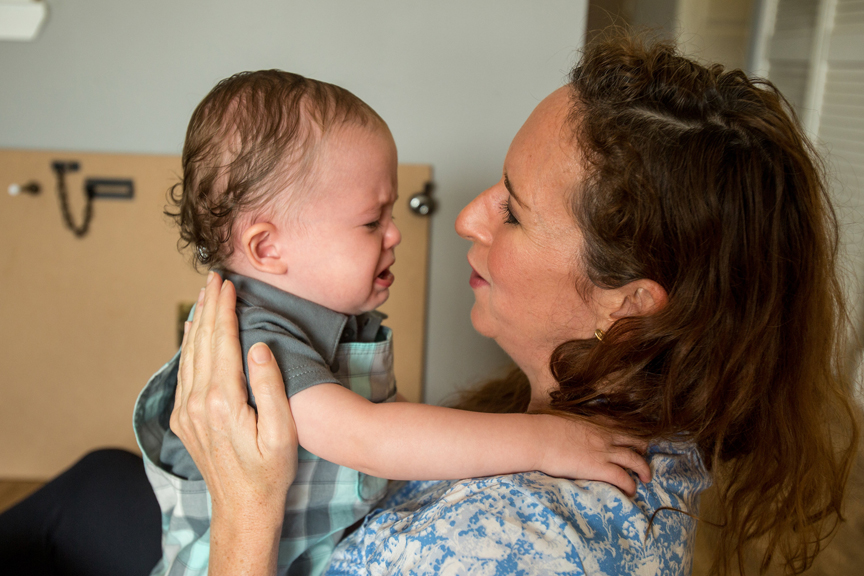- Behavior
- Health
- Parenting
Help! My baby won't stop crying

Nothing’s more heart-wrenching, or hair-raising, than listening to your baby cry and cry. And cry . . .
But there is hope. Here’s what you can do to help your baby, starting with figuring out the reason for the crying:
WHY IS YOUR BABY CRYING?
- Is he hungry?
- Too hot or too cold?
- Diaper needs changing?
- Teething?
- Getting sick? Any fever or other signs of illness like stuffy nose?
- Colicky?
- Bored, tired or overstimulated?
- Frightened by a loud noise or by strangers?
HOW TO SOOTHE YOUR BABY
- Respond quickly when your baby cries during the first few months of life, which can reduce crying overall. This also strengthens your bond, which improves your relationship and health.
- Play soft music, walk with her, rock her, hold her in a sling or front carrier, or swaddle her in a blanket as you carry or hold her. Car rides and soft noises, like running water, sometimes can be soothing.
- Call your pediatrician if you can't soothe her or if she pulls up her legs or passes gas often. She may have colic, which is intense crying for more than three hours a day.
- Calm yourself first so you can calm your baby: Count out loud to 10 or more; turn on your favorite music; phone a friend or relative for support or to come over and help out; write down your thoughts. Or reach out to Healthy Mothers, Healthy Babies for emotional support.
- NEVER EVER SHAKE YOUR BABY! If you’re stressed, place your baby in the crib and walk out of the room for a few minutes until you calm down. Shaking your baby can cause injury or even death. Make sure any caregiver knows this as well. Visit the National Center on Shaken Baby Syndrome for more details on how to handle excessive crying and the dangers of shaking a baby.
- Healthy Mothers, Healthy Babies Coalition of Palm Beach County
- National Center on Shaken Baby Syndrome
You May Also Like
-
- Health
- Parenting
- Safety
Safe sleeping arrangements can save your baby's life
Did you know the risk of infant death is 40 times higher when your baby sleeps with you? Find helpful safe sleep tips here to prevent a tragedy. …
Read More -
- Behavior
- Education
- Health
Is your baby hitting developmental milestones?
By 1 year old, a child usually can stand unsupported, speak single words and follow simple commands. Read on for more insight about key markers from our experts and how to reach ou …
Read More -
- Behavior
- Health
- Parenting
Is your baby eligible for health and developmental services?
When you're in the hospital, you'll likely be visited by a hospital liaison. This person works for an organization called HomeSafe, which is funded by Children's Services Council. …
Read More
Related resources
-
- Behavior
- Parenting
Center for Family Services of Palm Beach County
Positive Parenting Program, known as Triple P, offers free seminars and one-on-one guidance to help families improve the parent-child relationship
561-616-1222 Website Email -
- Education
- Parenting
- Things to do
BRIDGES of Palm Beach County
Ten neighborhood hubs help parents raise children healthy, safe and strong
561-740-7017 Website -
- Behavior
- Parenting
Community Partners
Positive Parenting Program, known as Triple P — free seminars and one-on-one guidance to help families improve their parent-child relationships
561-841-3500 Website Email -
- Other
- Safety
HomeSafe
Based in Lake Worth Beach, crisis intervention, planning, assessment, support, resources and therapy for victims of domestic violence and their children
561-383-9800 Website Email -
- Health
- Other
- Parenting
Healthy Mothers, Healthy Babies Coalition of Palm Beach County
A safety net of local services and support for pregnant women and families with infants, focusing on racial disparities in birth outcomes
561-623-2800 Website -
- Behavior
- Education
- Health
211 Palm Beach Treasure Coast
Help Me Grow – information, guidance and developmental assessment of children up to age 8
2-1-1 Website Email
